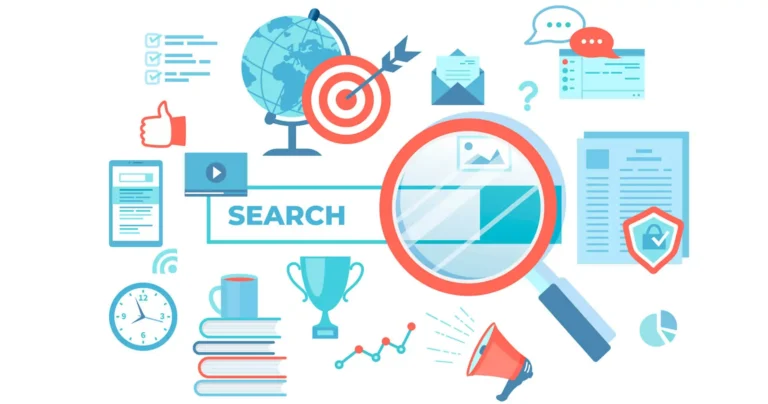In today’s digital landscape, Search Engine Optimization (SEO) is the art and science of making your website visible to the right audience. It’s more than just climbing search engine ranks—it’s about creating meaningful connections by helping users find the solutions they need, exactly when they need them. This article dives into the purpose of SEO, uncovering its main objective and why it’s indispensable for thriving in an online-first world.
Understanding the Basics of SEO
At its core, SEO (Search Engine Optimization) is the practice of enhancing your website to improve its visibility on search engine results pages (SERPs). The higher your site ranks, the better your chances of reaching your target audience.
SEO is built on three essential pillars:
- On-Page SEO: Fine-tuning your website’s content, meta tags, and internal links to deliver value and relevance.
- Off-Page SEO: Building authority through backlinks, social signals, and mentions across the web.
- Technical SEO: Ensuring your site is fast, mobile-friendly, and easy for search engines to navigate.
Together, these elements create a strong foundation for driving organic traffic and elevating your online presence.
The Main Purpose of SEO
The main goal of SEO is to bridge the gap between user needs and search engine expectations.
- Enhancing User Experience (UX): SEO ensures users find high-quality, relevant, and accessible content while enjoying fast loading speeds and intuitive navigation.
- Meeting Search Engine Criteria: It aligns your website with search engine algorithms by optimizing structure, providing clear data, and meeting ranking factors.
- Driving Organic Traffic: Unlike paid methods, organic traffic is sustainable and cost-effective, attracting users genuinely interested in your offerings.
At its heart, SEO is about creating value for users while meeting search engine standards.
Why the User is the Focal Point of SEO
At its core, SEO revolves around the user.
Why SEO Matters:
Enhancing User Experience (UX): SEO delivers what users crave—high-quality, relevant content, lightning-fast loading speeds, and seamless navigation.
Winning Search Engines Over: By aligning your site with algorithms, optimizing structure, and hitting key ranking factors, you stay ahead in the game.
Driving Cost-Effective Traffic: Organic traffic isn’t just free—it’s sustainable, bringing in genuinely interested users who want what you offer.
At its core, SEO is all about delivering true value to users while winning the trust of search engines! Ready to thrive?
Long-Term Benefits of SEO
SEO isn’t just about short-term wins; it’s a strategy for sustained growth.
- Building Brand Authority and Credibility: Consistently ranking high in search results builds trust with users, positioning your brand as an industry leader.
- Generating Qualified Leads: By targeting specific search queries, SEO attracts users who are already looking for solutions, increasing the likelihood of conversion.
- Staying Ahead of Competitors: Regularly optimizing your site keeps you ahead in the competitive digital landscape, ensuring your brand remains visible and relevant.
With SEO, the long-term benefits are clear—more visibility, credibility, and growth.
Common Misconceptions About the Purpose of SEO
There are several myths about SEO that can lead businesses down the wrong path.
Purpose of SEO is More Than Just Rankings: High rankings are just the beginning! The real goal is to attract engaged users who genuinely find value in your content.
Ditch the Keyword Stuffing: While it may seem tempting, keyword stuffing won’t cut it. Seamlessly integrating keywords naturally creates a smoother, more user-friendly experience.
Don’t Neglect UX and Content Quality: Focusing solely on search engines can backfire. Without top-notch user experience and content, even the best SEO efforts can fall flat. Understanding the Purpose of SEO means focusing on delivering valuable, relevant content to users while meeting search engine requirements.
SEO is about striking the perfect balance between meeting both user needs and search engine requirements for long-lasting success.
Actionable Takeaways for Businesses
To get the most out of SEO, businesses should focus on these key actions:
- Conduct Regular Keyword Research: Stay ahead by identifying evolving trends and understanding what users are searching for.
- Focus on Technical and Content Excellence: Regular audits help fix technical issues and ensure your content remains relevant and optimized for both users and search engines.
- Monitor Analytics and Adapt Strategies: Tools like Google Analytics and Search Console provide valuable insights into your performance, allowing you to tweak your strategy and improve results over time.
By staying proactive and adaptable, businesses can ensure their SEO efforts continue to drive success.
Conclusion
At its core, the purpose of SEO is about aligning your website’s content and structure with both user intent and search engine criteria, creating real value for your audience. By balancing technical optimization, high-quality content, and a focus on user experience, businesses can achieve long-term SEO success that drives sustainable growth.
Ultimately, the key to SEO is not just ranking higher, but building a meaningful connection with users that continues to pay off.
Ready to take the next step?
Ready to boost your online presence and drive more organic traffic? At ML Digital Marketing, we specialize in crafting SEO strategies that not only improve rankings but also deliver real value to your audience. Contact us today to get started on optimizing your website for long-term success! Let’s unlock your business’s potential and stand out in the digital world.
FAQs
1. What is SEO?
SEO (Search Engine Optimization) is the practice of optimizing your website to improve its visibility and ranking in search engine results, ultimately attracting more organic traffic.
2. Why is SEO important?
SEO helps businesses connect with users who are actively searching for relevant information, products, or services, driving long-term, sustainable growth and improving user experience.
3. What are the main components of SEO?
SEO includes three key areas:
- On-page SEO (content, meta tags, internal linking)
- Off-page SEO (backlinks, social signals)
- Technical SEO (site speed, mobile optimization, crawlability)
4. How does SEO benefit businesses?
SEO builds brand authority, generates qualified leads, and helps businesses stay ahead of competitors by ensuring ongoing visibility and relevance.
5. Is SEO just about ranking higher?
No, ranking higher is just a means to an end. The real goal is to provide valuable, relevant content that meets user needs and drives engagement.
6. How can businesses improve their SEO?
Businesses should conduct regular keyword research, focus on content and technical excellence, and track performance using tools like Google Analytics to refine their strategies.








